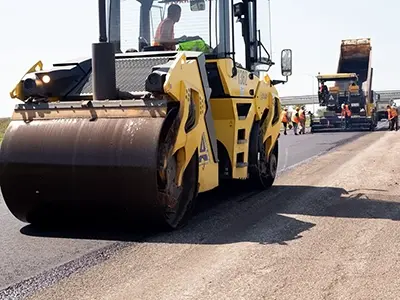
In the territory of the Dnipropetrovsk region, which since the beginning of the full-scale invasion of Russia has found itself in a critically important area for rear logistics, large-scale work has begun to restore roads worn out both as a result of intensive use and due to the limited capabilities of full-fledged maintenance in war conditions. Work is being carried out in six directions at once, and at the center of these efforts is the Avtomagistral-Pivden company, which has involved almost two hundred specialists at the sites, as well as dozens of units of equipment. The restoration covers both local roads and larger arteries, which are currently used for humanitarian transportation, delivery of military cargo and movement of critical infrastructure teams. Damage caused by constant vibration from large-sized equipment and violation of the operating mode in stressful conditions also played a significant role in the deterioration of the condition of the road surface.
The repair process involves varying levels of complexity depending on the specific area, which has become especially important against the background of limited funding and the need to ensure maximum results in the shortest possible time. In some areas, it is enough to carry out pothole repairs and level the surface, while in other places, specialists are forced to completely dismantle the old pavement, strengthen the base, lay a crushed stone-sand mixture with the addition of cement, and then apply two layers of asphalt concrete. This technology ensures a longer service life and resistance to loads, which is especially critical in conditions of increased supply transport traffic. It is important to note that all construction materials - from asphalt concrete mixtures to crushed stone-sand mixtures - come from the company's own production facilities located within the region, which reduces logistics costs and speeds up the process of delivering the required volumes directly to the work sites.
It must be recognized that a significant part of these roads were in an unsatisfactory condition even before the war, since they had not previously been included in the priority lists under the state program "Big Construction". Unfortunately, with the beginning of the invasion, their reconstruction was postponed indefinitely, and only now has the opportunity arisen to return to these tasks. Over the past two years, the already worn-out sections have been under significant strain: convoys of humanitarian aid, evacuation flights, military caravans and construction equipment have not only increased the traffic intensity, but also completely destroyed the road surface. However, the new wave of restoration is taking a more comprehensive approach: the emphasis is not just on patching up problem areas, but on bringing the entire road into a condition suitable for year-round use.
According to the statement of representatives of Avtomagistral-Pivden, the main volume of work is planned to be completed by the end of August, so that these roads can fully perform their logistical function in the fall. It is noteworthy that despite the difficult situation with state resources, the project is being financed without delays, and part of the costs are covered by previously allocated reserves. Every day, more and more sections are again becoming accessible for full-fledged movement, and the updated surface promises to withstand not only weather tests, but also high loads of military and construction equipment. In the long term, this strengthens both the region's defense capability and the potential for subsequent economic recovery in the frontline zone. In a protracted war, when every kilometer of road can affect the delivery time of critical supplies, such projects acquire special strategic importance.

